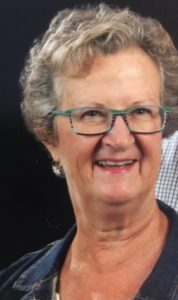Category Archives: Uncategorized
Susan Surette-Draper

Susan grew up in Ste Anne du Ruisseau (also known as Lower Eel Brook) in Yarmouth County, NS, where her family has lived for 7 generations. You may know her from her most recent employment as an interpreter at Grand-Pré National Historic Site.
In 2004 she wrote the booklet “Return to Acadie. A Self-Guided Memory Walk of the Annapolis Valley” as a tool for anyone interested in discovering the Annapolis Valley from an Acadian perspective. Whether people have downloaded it from the website of Les Amis de Grand-Pré www.amis-de-grand-pre.ca or have a hard copy, it is still providing useful information to searchers.
For the last 10 years, Susan has been the president of Les Amis de Grand-Pré. Susan is presently finishing a second book, tentatively called Refuge, which promises to shine a light on a little-known Acadian story of survival, in a very personal way. In the summer you can find her in her garden or heading off to paint en Plein Air.
Her blog: travelswithsuze.wordpress.com has suffered from lack of attention lately but you can still read her personal stories animated by Acadian landscapes, whether they be found in Atlantic Canada, Québec, France or England.
Dr. Louise Carbert

Louise Carbert has been at Dalhousie University since 1995. She teaches and publishes on women’s political leadership, rural political economy, and Nova Scotia politics. She was a member of the national 2012 Boundaries Commission for Nova Scotia and has served on the Nova Scotia Advisory Council on the Status of Women.
Dr. S. Karly Kehoe

Dr. S. Karly Kehoe is the Canada Research Chair in Atlantic Canada Communities. Karly’s primary research areas are religion, migration, and minority identities in the British Atlantic, but she is also interested in sustainable development and rural change in Nova Scotia and the Scottish Highlands. In addition to co-editing (with Chris Dalglish) the Histories of the Scottish North Atlantic book series with Edinburgh University Press, Karly is an advocate of displaced and at-risk academics. She sits on the editorial boards of both the Scottish Historical Review and the Innes Review and is a fellow of the Royal Historical Society. She is also president-elect of the Royal Society of Canada’s College.
Sara Hollett
Sara Hollett has a Bachelor of Art’s degree in Atlantic Canada Studies and History from Saint Mary’s University, and completed her Master’s in Public History at Carleton University in 2017. Her MA research focused on the Nova Scotia tourism industry in the 1950s and 1960s. Her Major Research Essay, which today’s paper is based on, questions past and present reception of tourism promotion in the province and how this promotion can shape and be shaped by Nova Scotia identity, economy and culture. Professionally, she has worked for the Canadian Museum of Immigration at Pier 21, Library and Archives Canada, Parks Canada, and currently as Archives Advisor for the Council of Nova Scotia Archives.
Stefanie Slaunwhite
Stefanie has had a lifelong fascination with all things historical. From a young age, she and her parents ventured to museums across the Maritimes. Upon entering university, Stefanie knew she wanted to study history. She completed her Bachelor of Arts with Honours in Atlantic Canada Studies and her Master of Arts in Atlantic Canada Studies, both at Saint Mary’s University. Her Master’s thesis, entitled “The Intricacies of Integration: The Case of Graham Creighton High School” won the Governor General’s Gold Medal for Academic Excellence at convocation. The research from Stefanie’s thesis inspired the lecture she is giving for the Royal Nova Scotia Historical Society. Stefanie is currently a PhD Candidate at UNB New Brunswick in Fredericton. In her free time, she enjoys fishing, hiking, and volunteering with Girl Guides of Canada.
Annual Dinner 2019
Royal Nova Scotia Historical Society Annual Dinner Meeting
Wednesday, 17 April 2019 — 6:00 for 6:30
Dalhousie University Club
6259 Alumni Crescent located just off South Street, Halifax, Nova Scotia
Lecture: “Women and the War at Home: Pictou County Women in Industrialized Work, 1939 to 1945: The New Woman Worker of Shipbuilding” by Kirby Ross
As Canada entered the Second World War, the opportunities for women had to change drastically, as a vast number of men were sent across the world to fight against the Axis powers. World War Two provided newfound opportunities for women to join work forces which had previously been closed off to them. Particularly, these new jobs were found in the industrial settings that men left. Employers in Pictou County needed to replace the missing men, and women filled these positions. Industrial roles clearly differed from the domestic work that women primarily performed before the war years. Some of these jobs were in fields that women had worked in during World War One while others represented new opportunities. In Pictou County, women began working in different industrial fields, such as shipbuilding. With labour shortages, the attitude towards women working in this field changed as demand grew for these jobs to be filled. In examining Pictou County, an important industrial center in Nova Scotia but relatively small by Canadian or global standards, the presentation will analyse not only the new work opportunities that opened to women in shipbuilding but also illustrate the ties between these new industrial opportunities and women’s prior experience and the social and economic networks that shaped their industrial employment.
Menu
Farmer’s Market Salad with Spiced Goat Cheese Rounds:
Served with house made traditional French vinaigrette
Mediterranean Chicken stuffed with Olives, Feta, Roasted Red Peppers and Fresh Basil:
Finished with a rosemary brown sauce, Chef’s choice of potatoes and vegetables
Or
Vegan Shepherd’s Pie:
With lentils and a medley of vegetables finished with creamy sweet potatoes
Chocolate decadent brownie plated with berries (GF)
Tea and coffee
$50 per person payable in advance before Friday, 12 April.
Maximum seating for 50 people.
For reservations contact Rosemary Barbour,
with choice of menu option (Mediterranean Chicken or Shepherd’s Pie):
Email: membership@rnshs.ca or Telephone: 902-424-6070
Please note that cancellations can not be accepted after 12 April.
Seating for this event is limited. If you are interested in attending, please notify Rosemary Barbour at 902 424-6070 or email membership@rnshs.ca to ensure your ticket reservation and before submitting payment.
Cheques or money orders should be made payable to “Royal Nova Scotia Historical Society” and mailed to:
Rosemary Barbour, RNSHS Membership Secretary
6016 University Avenue
Halifax, NS B3H 1W4
Heidi MacDonald
Heidi MacDonald is Dean of Arts and Professor of History and Politics, University of New Brunswick Saint John. She in an historian of twentieth-century Canada with specializations in Atlantic Canada, the Great Depression, women religious (nuns), suffrage, and youth. Her publications include the co-authored monograph (with Rosa Bruno-Jofré and Elizabeth Smyth) Vatican II and Beyond: The Changing Mission and Identity of Canadian Women Religious (McGill-Queen’s, 2017), and the forthcoming We Shall Persist: Suffrage and Human Rights in Atlantic Canada (UBC Press).
Bob Sayer
Bob emigrated from U.K. with his young family in 1968. He holds a B.A. Hons. Politics and Modern History, University of Manchester (a fan of ‘City’ and ‘United’) and completed Master’s course work in History at Dalhousie. He is a retired South Shore schoolteacher, principal, and supervisor of schools. His various accomplishments include being inducted into the Nova Scotia Sports Hall of Fame and awarded Life Memberships of South Shore District Soccer, Soccer Nova Scotia, and Canadian Soccer Associations for his services to the game. Bob has been a movie critic columnist and commentator with South Shore and Valley newspapers as well as CKBW for a decade. Bob’s publishing record includes Mahone Bay Old School: A life and Times. He is currently preparing a book for the Town of Mahone Bay, Mahone Bay entitled The Town: A Centennial Celebration, 1919-2019 which is slated for release later this year. Bob is also working on a book entitled Two Great Mi’kmaw Sagamows: Messamouet and Paul Laurent.







